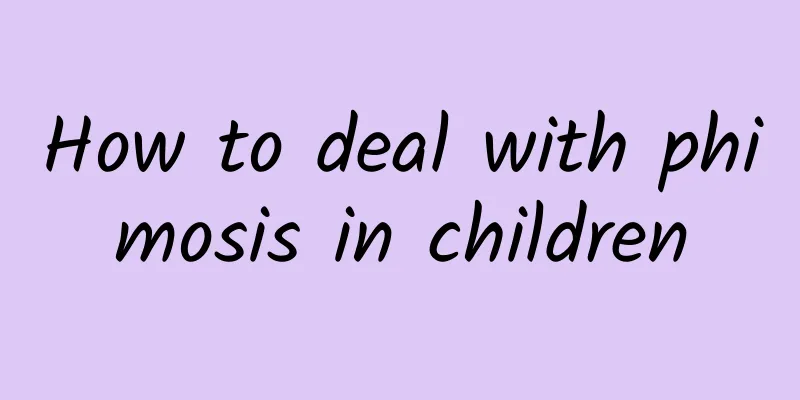The child coughs in the middle of the night but not during the day?

|
Children's coughing is a very common phenomenon in daily life. Many children do not cough much during the day, but they do cough very badly at night. The baby's cough is not only uncomfortable for the baby, but also affects his sleep at night. Parents are also distressed when they see it. In fact, under normal circumstances, babies usually cough during the day and not at night. They should sleep peacefully at night. What is going on? The following explains why children cough at night but not during the day. Coughing is a normal physiological defense reflex and is the body's way of clearing its respiratory tract. If the child coughs slightly, it means that the child is clearing out the "foreign matter" accumulated in the respiratory tract (including secretions produced by the respiratory mucosa, tiny foreign substances inhaled or choked, etc.), and parents do not need to worry too much. The younger the child, the weaker his cough reflex is, and the cough may last longer. If parents rush to give their children various cough suppressants at this time, the mucus in the respiratory tract cannot be discharged smoothly and accumulates in large quantities, which can easily cause airway blockage and cause other diseases. Some common reasons are: poor room hygiene, dirty pillows, quilts, and sheets, crawling with mites, and children's strange sleeping positions. After excluding these, the most common clinical causes are cough variant asthma, and "night cough" caused by nasal, pharyngeal, and digestive system diseases. "Night cough" caused by cough variant asthma: Cough variant asthma, also known as "allergic cough", refers to a special type of asthma with cough as the main or only symptom. Its pathophysiological changes are consistent with asthma. That is to say, the airways of these children, like the airways of children diagnosed with asthma, are more susceptible to irritation by "foreign bodies" than normal children. The main manifestation of this disease is persistent or recurring cough for more than one month, which is more common in spring and autumn. The main symptom is a cough at night or in the early morning, with dry cough and little sputum. The child's cough will worsen after strenuous activity. There are no obvious clinical symptoms of infection, or there is no symptom improvement after a long period of "anti-inflammatory drug" treatment, but the coughing attacks can be alleviated after treatment with bronchodilator drugs and hormone drugs. If you ask in detail, you can often find out that the child himself or someone in his blood family has a history of "allergy" (such as eczema, asthma, rhinitis, urticaria, etc.). You should go to the hospital for a detailed examination, let the doctor evaluate and diagnose, and then use the appropriate medication. Of course, if it is confirmed to be this disease, you must be prepared for a "long-term battle" and cannot stop taking the medication just because "the symptoms have improved and I don't cough as much anymore." In theory, the treatment of cough variant asthma should not be less than 8 weeks, but it depends on the individual's disease control situation. "Night cough" caused by nasal and pharyngeal diseases: "Night cough" caused by acute or chronic inflammation of the nose and pharynx is common in clinical practice. It is very simple if you think about it carefully: when you sleep, most of the body's tissues and organs enter a resting state, but under the stimulation of inflammation, the nasal cavity and pharynx will still secrete mucus without the body's subjective control, and under the influence of gravity, these mucus will accumulate in the back of the nasal cavity and pharynx. At the beginning, there is little mucus, and the sleeping reaction is slow, so you may not feel anything; but over time, the accumulated secretions increase, which strongly stimulates the upper respiratory tract and causes coughing. Children of this type may also have symptoms such as nasal congestion, snoring, throat clearing (excluding tics), and dry heaving when brushing their teeth in the morning. For "night cough" caused by this reason, if you only use symptomatic cough suppressants, the effect is often minimal. Treatment should still start with the cause of the disease. If you have rhinitis, treat it. If you have pharyngitis, treat it. If you are in the acute stage of cough, you need to supplement cough suppression on the basis of "cause treatment". "Night cough" caused by digestive system diseases: "Night cough" caused by digestive system diseases is also not uncommon. Children of this type often have symptoms of "gastroesophageal reflux", or in layman's terms, "acid reflux". When you sleep, your body lies flat, and stomach acid is more likely to flow up the esophagus to the throat. The stomach acid stimulates the upper respiratory tract and causes a reflex cough. |
<<: What should I do if I have a severe cough late at night?
>>: Why is coughing worst at night?
Recommend
Sweating at night
Summer is here, and the situation will become mor...
I got pregnant after taking ovulation-stimulating Chinese medicine
Many couples often try to prepare for pregnancy b...
How to protect your ovaries and uterus, so your ovaries will be 5 years younger
The ovaries and uterus are very important to wome...
Causes of split toenails
Why does toenails detach? Does toenails detach me...
What medicine should I take for buzzing in my ears?
If you have buzzing sounds in your ears, you may ...
Malignant thyroid tumor
There are many common diseases in life. When trea...
How to diagnose gout
Gout is a joint disease caused by the deposition ...
Symptoms of skin melanoma
Long-term exposure to the sun may cause melanin t...
Common digestive system diseases
If people are not careful when eating grains, it ...
Causes of lower gum recession
Gum recession is quite common in our daily life. ...
What are the health-preserving teas for autumn?
Seasonal changes often bring some troubles to peo...
Use of the pituitary gland in severe hemoptysis
The hormones secreted by the pituitary gland play...
The absolute value of immature granulocytes is high
Those who have had a routine blood test in the hos...
How to induce menstruation when your period is delayed
Every woman has her own menstrual cycle. The main...
What causes myocardial infarction? Causes of Myocardial Infarction
The reason why many people suffer from myocardial...









